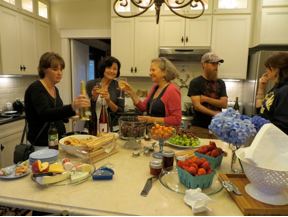Of Spinning and Writing: In Defense of MFA Programs
![]()
![]()
![]()
![]()
![]()

Last month in my 6 a.m. spinning class, sweating up an imaginary hill on my stationary bike—rap music thumping, my frighteningly enthusiastic instructor whooping encouragement—I realized, as disciplined as I believe I am, there was no way I’d be there that time of day, working that hard, if I didn’t have a class to attend. A teacher to yell at me. Sleepy people on either side of me spinning themselves awake. Then, in the loose way our minds make connections when we haven’t quite shaken sleep, I flashed to my MFA program. It, too, provided me structure and motivation to work harder than I thought I could.
As we shifted into sprints and our breath fogged the windows, all the arguments against MFA programs I’d read over the last several years spun through my head (in essays with names such as “The MFA/Creative Writing System Is a Closed, Undemocratic, Medieval Guild System that Represses Good Writing”):
- Writing programs produce “workshop style” prose, dulled by group consensus and shaped by a particular aesthetic, a reflection of the tastes of the famous and narrow-minded instructors.
- Writing programs create an elitist, self-perpetuating literary community, which controls the publishing world and excludes innovative, outside voices.
- Or, contrarily, the recent proliferation of writing programs has lowered standards, releasing into the world a mass of marginally trained beginners.
- Besides, writing can’t be taught.
The arguments are well-reasoned and convincing—and I confess I don’t know enough about the most elite writing programs to address criticisms lobbed particularly at them—but they don’t speak to my experience, to the three years I spent in my low-residency MFA program, which did not transform me into a famous writer, but which challenged and stretched me, provided an inspiring community that has sustained me since, and reshaped, not just my writing, but my life.
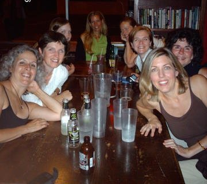 As the spinning instructor pressed us into a fast stretch on an imaginary highway, I tried to articulate to myself what felt like a bias in the critiques, not about what constitutes fine writing, but about what kind of person is a true writer. An image forms in my mind. A typewriter. A small room. A bottle of whiskey. The face looks familiar. It’s Hemingway! Not the real Hemingway, with his crazy neediness, but the Hemingway of our imagination. Independent. Charismatic. Curmudgeonly. He has a masculine confidence in his own words and worth—and his own distinct, controversial writing style. He doesn’t follow trends; he makes them!
As the spinning instructor pressed us into a fast stretch on an imaginary highway, I tried to articulate to myself what felt like a bias in the critiques, not about what constitutes fine writing, but about what kind of person is a true writer. An image forms in my mind. A typewriter. A small room. A bottle of whiskey. The face looks familiar. It’s Hemingway! Not the real Hemingway, with his crazy neediness, but the Hemingway of our imagination. Independent. Charismatic. Curmudgeonly. He has a masculine confidence in his own words and worth—and his own distinct, controversial writing style. He doesn’t follow trends; he makes them! 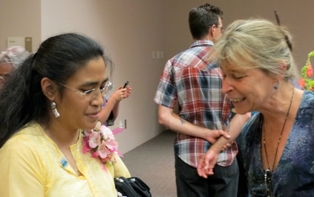 I recently read an old craft book by Robert Bahr, Dramatic Technique in Fiction, which crystallizes this portrait: “For the most part, accomplished writers are friendly, vivacious, entertaining people, but there is no getting around the fact that they have strong egos . . . they generally get along well with those who treat them with deference and are vicious competitors when challenged.” This Hemingway model suggests we are not worthy of being writers if we doubt ourselves or thrive in non-competitive community.
I recently read an old craft book by Robert Bahr, Dramatic Technique in Fiction, which crystallizes this portrait: “For the most part, accomplished writers are friendly, vivacious, entertaining people, but there is no getting around the fact that they have strong egos . . . they generally get along well with those who treat them with deference and are vicious competitors when challenged.” This Hemingway model suggests we are not worthy of being writers if we doubt ourselves or thrive in non-competitive community.
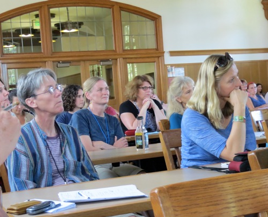 The truth is—whether caused by genetics, life experiences, or cultural forces such as racism, sexism, age-ism—some of us do not possess the gift of confidence. But that is no reflection on our potential. Early in my career, I taught English in a school for at-risk teenagers. I finally abandoned my unsuccessful attempts at a traditional literature program and just let them write. They produced some of the most raw, rhythmic, original, poetic prose I’ve ever read. It stunned me.
The truth is—whether caused by genetics, life experiences, or cultural forces such as racism, sexism, age-ism—some of us do not possess the gift of confidence. But that is no reflection on our potential. Early in my career, I taught English in a school for at-risk teenagers. I finally abandoned my unsuccessful attempts at a traditional literature program and just let them write. They produced some of the most raw, rhythmic, original, poetic prose I’ve ever read. It stunned me.  They resisted both revision and publication, so the world will never read their work. But I’d learned a secret. Remarkable writing comes from all kinds of people, from shy and bold, educated and uneducated, confident and self-defeating. In my many teaching years since, I’ve read beautiful, original pieces written by the talented and confident, the talented and insecure, and those who seemed to have no talent at all but who labor over their work. Each of these future writers deserves the opportunities that match their needs, whether a solitary room in Key West or in an MFA program.
They resisted both revision and publication, so the world will never read their work. But I’d learned a secret. Remarkable writing comes from all kinds of people, from shy and bold, educated and uneducated, confident and self-defeating. In my many teaching years since, I’ve read beautiful, original pieces written by the talented and confident, the talented and insecure, and those who seemed to have no talent at all but who labor over their work. Each of these future writers deserves the opportunities that match their needs, whether a solitary room in Key West or in an MFA program.
The fan blowing on our faces isn’t enough to ease the muggy heat. Our sweat drips on the floor; moisture beads run down the window like rain. The instructor shouts, “Let me hear you, people! One long hill. Ten minutes. Go!” My thighs ache, but I increase the resistance on my bike and press on.
 I’m not a Hemingway writer. I’m a people pleaser. I don’t admire this trait in myself. (I must have been born this way, because my hippy parents were deeply disappointed in my over-eager obedience.) This trait has worked against my growth as a writer because I’m easily swayed to fill my time with other people’s worthy work. But since I couldn’t seem to eradicate this tendency, I decided to use it on behalf of my writing. I applied to an MFA program because I knew I’d work hard to meet the deadlines and expectations of teachers I admired. It worked.
I’m not a Hemingway writer. I’m a people pleaser. I don’t admire this trait in myself. (I must have been born this way, because my hippy parents were deeply disappointed in my over-eager obedience.) This trait has worked against my growth as a writer because I’m easily swayed to fill my time with other people’s worthy work. But since I couldn’t seem to eradicate this tendency, I decided to use it on behalf of my writing. I applied to an MFA program because I knew I’d work hard to meet the deadlines and expectations of teachers I admired. It worked.
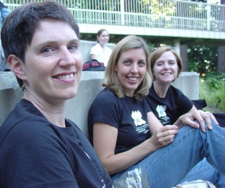 When I started my program, I hoped only that the structure would help me make writing a priority and I’d pick up a few advanced skills. I’d underestimated the power of mentors. I should have guessed: in my work with at-risk teens, I’d researched what fosters resilience in those from disadvantaged backgrounds. The number one predictor of future success? Mentors. The number one way to increase the percentage of underrepresented minorities in top career fields? Mentors. Yes, my MFA mentors were skilled writers generous with their wisdom, but even more, they showed me, in their various creative ways, how to build a writing life—especially in a culture that rewards very few writers financially and that offers constant, bombarding distraction. They modeled how to make a living, prioritize writing, navigate the demands of family and friends, and manage emotions around success and failure.
When I started my program, I hoped only that the structure would help me make writing a priority and I’d pick up a few advanced skills. I’d underestimated the power of mentors. I should have guessed: in my work with at-risk teens, I’d researched what fosters resilience in those from disadvantaged backgrounds. The number one predictor of future success? Mentors. The number one way to increase the percentage of underrepresented minorities in top career fields? Mentors. Yes, my MFA mentors were skilled writers generous with their wisdom, but even more, they showed me, in their various creative ways, how to build a writing life—especially in a culture that rewards very few writers financially and that offers constant, bombarding distraction. They modeled how to make a living, prioritize writing, navigate the demands of family and friends, and manage emotions around success and failure.
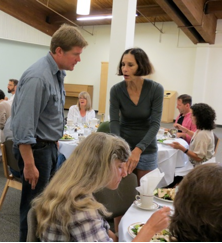 The critics don’t argue against mentors, but suggest writers should find them organically. Think Hemingway gathered with the expatriates in Gertrude Stein’s Paris salons. But not all of us know where to find a mentor, and even if we did, we’re too polite or shy to impose on their precious time. Critics argue that MFA programs are classist, but I also believe it’s classist to demand writers find their own support. Now that I teach privileged teenagers, I recognize how much easier it is for those raised in well-off families to find mentors. They have spent their lives cultivating an appealing, graceful assurance. They know how to network, have access to people who know people, and have the confidence to ask for what they want. The rest of us need an MFA program.
The critics don’t argue against mentors, but suggest writers should find them organically. Think Hemingway gathered with the expatriates in Gertrude Stein’s Paris salons. But not all of us know where to find a mentor, and even if we did, we’re too polite or shy to impose on their precious time. Critics argue that MFA programs are classist, but I also believe it’s classist to demand writers find their own support. Now that I teach privileged teenagers, I recognize how much easier it is for those raised in well-off families to find mentors. They have spent their lives cultivating an appealing, graceful assurance. They know how to network, have access to people who know people, and have the confidence to ask for what they want. The rest of us need an MFA program.
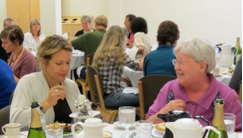 And those complaints that MFA programs produce too many writers and that writing can’t be taught? I agree there is a certain luminous originality in the finest writing that can never be taught. But after years of seeing students’ awe-inspiring growth over a semester’s time, no one can convince me that most writers won’t improve, dramatically, with regular practice and structure and meaningful feedback. (I think that is also a cultural bias, an American Western, individualistic, frontier mentality: many other cultures value apprenticeship, elders, and generations of accumulated wisdom.)
And those complaints that MFA programs produce too many writers and that writing can’t be taught? I agree there is a certain luminous originality in the finest writing that can never be taught. But after years of seeing students’ awe-inspiring growth over a semester’s time, no one can convince me that most writers won’t improve, dramatically, with regular practice and structure and meaningful feedback. (I think that is also a cultural bias, an American Western, individualistic, frontier mentality: many other cultures value apprenticeship, elders, and generations of accumulated wisdom.)  The typical MFA program may not birth genius, but the students improve. And aren’t we all better off when people pursue their passions, when chefs, mechanics, surgeons, parents or musicians are happier and more skilled? Also, I believe what when we struggle with our writing, regardless of the final results, we think more clearly and understand more deeply—and our communities improve when any of us does work that loosens our hearts and defogs our brains.
The typical MFA program may not birth genius, but the students improve. And aren’t we all better off when people pursue their passions, when chefs, mechanics, surgeons, parents or musicians are happier and more skilled? Also, I believe what when we struggle with our writing, regardless of the final results, we think more clearly and understand more deeply—and our communities improve when any of us does work that loosens our hearts and defogs our brains.
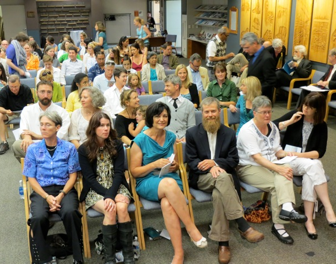 I step from the bike and wipe the sweat with my soggy towel. My legs shake. We clap for our teacher and ourselves. I gulp my water. I try to hold the shape of my essay in my mind long enough to get home and transfer it to the page.
I step from the bike and wipe the sweat with my soggy towel. My legs shake. We clap for our teacher and ourselves. I gulp my water. I try to hold the shape of my essay in my mind long enough to get home and transfer it to the page.
But at home, the essay doesn’t organize itself as easily as it did in my exercised-fueled brain. I don’t want to blast the critics. Their arguments sprout from noble impulses: a desire to dissolve exclusive clubs, a passion for innovative writing, a respect for literature and love of excellence. So, as I have learned to do, I listen to my writing as I might a timid, wild animal. Carefully. With attention. 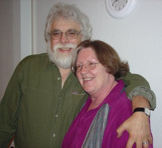 When I read the critics, I sense something else pulsing under the surface—is it my imagination?—the personal pain the writers may feel that their own creative work has not been recognized by the establishment. Then I see that I, too, am not writing what I thought I was. I thought I was adding my voice to the debate about the value of MFA programs. I thought this was an essay. But it’s just a disguise. This is a thank you note to my program and mentors. This is a love letter.
When I read the critics, I sense something else pulsing under the surface—is it my imagination?—the personal pain the writers may feel that their own creative work has not been recognized by the establishment. Then I see that I, too, am not writing what I thought I was. I thought I was adding my voice to the debate about the value of MFA programs. I thought this was an essay. But it’s just a disguise. This is a thank you note to my program and mentors. This is a love letter.

Tarn Wilson is a happy graduate of the Rainier Writing Workshop at Pacific Lutheran University. Her recent essays have been published in Gulf Stream, Harvard Divinity Bulletin, Inertia, Life Writing, Ruminate, and The Sun. “Of Spinning and Writing” first appeared in Brevity Magazine’s May 13, 2013 Nonfiction Blog. Many thanks to Dinty Moore for permission to reprint Tarn’s lovely testimonial.
Thanks also to all of the past and present participant photographers who sent us photos for this essay. Credits as follows: “Community Buffet” by Rebecca Saxton, “Knee-Walking at Northern Pacific” by Kelli Russell Agodon, “Craft Lecture” by Rebecca Saxton, “Self Portrait in Solitary” by Tom Cantwell, “Mentors I” by Rebecca Saxton, “People Pleasing Participants” by Kelli Russell Agodon, “Mentors II” by Rebecca Saxton, “Mishele and Judith” by Rebecca Saxton, “RWW Marmots” by Anne Donaghy, “Graduation” by Rebecca Saxton, “Stan and Judith” by Kelli Russell Agodon, “Mt. Rainier” by Anne Donaghy

